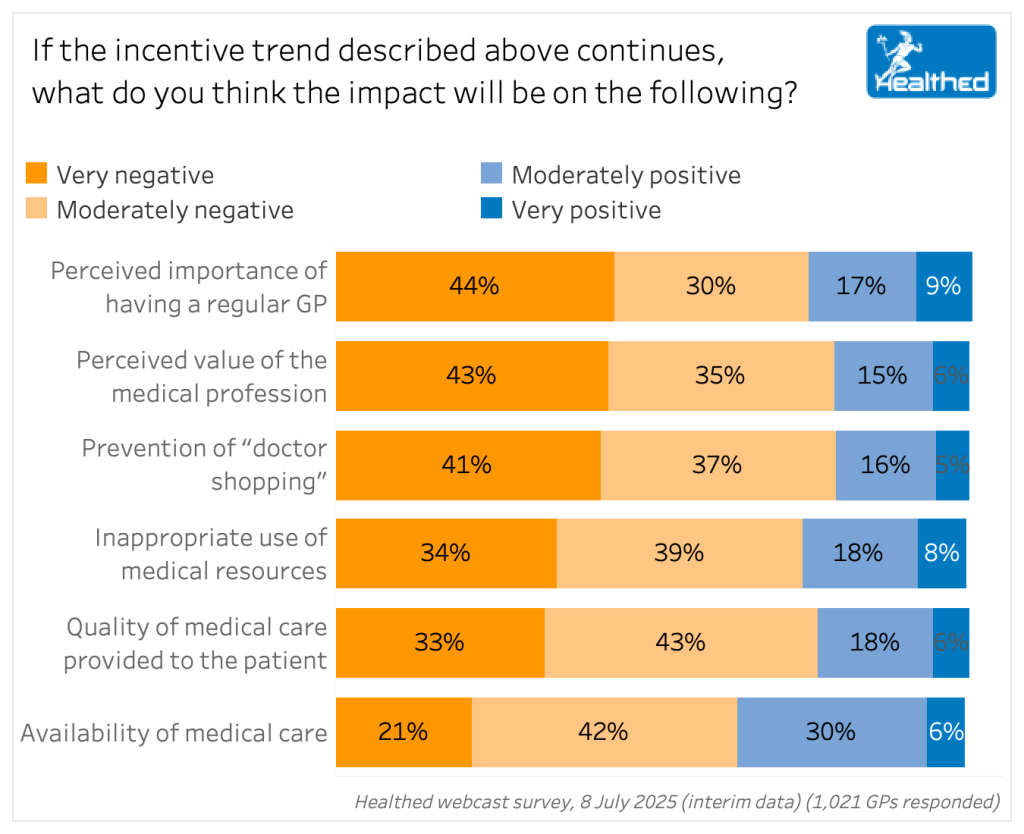Articles / Woolies rewards points for booking telehealth – better access or bribery?

Online advertising offering consumers 1000 ‘Everyday Rewards’ points when they book their first telehealth consultation with a doctor at the Woolworths’ owned Healthylife is the latest example of the commodification of healthcare, and nine out of 10 GPs reckon it’s wholly inappropriate.

Eighty-seven percent of 1045 GPs who have responded to Healthed’s poll so far say the incentive is inappropriate, and 78% think that if the trend continues, it will negatively impact the public’s perceived value of the medical profession.
Healthylife is a digital platform that offers telehealth consultations with doctors, with services including online prescriptions and medical certificates, as well as a pharmacy and healthy lifestyle advice.
Woolworths acquired the brand in 2019, and customers can collect 1 point for every dollar spent in the Healthylife shop – but 1000 points are only worth about $5 when redeemed.
Of 435 GPs who elaborated on their outrage, more than a third cited ethical concerns, with many describing the scheme as “bribery.”
This was the most common characterisation of the offer.
“It is a bribe to drum up business and this should be strongly condemned. If any health practitioner does it, AHPRA will be screaming, and they will be immediately reprimanded. But big business can get away with this sort of exploitation,” one GP commented.
In fact, AHPRA’s advertising guidelines do allow for “gifts, discounts and inducements,” provided the terms and conditions are clear, accurate and honest, and easy to understand and find.
“I don’t think it would be seen as acceptable if a GP offered direct incentives to get patients booking telehealth consults! It’s just about money-making, not about long-term commitment to healthcare,” another GP said.
“Incentivising doctors consults effectively through a monetary carrot – NOT ON! So corrupt!” – surveyed GP
“If we have rightly banned pharmaceutical companies from offering doctors gifts to avoid conflicts of interest, then similar scrutiny should apply to retail corporations offering rewards to influence healthcare access,” another commented.
“Incentivising a professional consult with food points is tacky and trivialising health,” another GP said.
Around 27% of GPs commented that this type of offer put commercial interests above patients.
“The interest is money, not patient care,” one GP noted.
“Woolworths is not doing this for the benefit of anyone or anything except their bottom line,” another GP said.
“Health should not be related a shopping experience,” said another.
Concern over reduced continuity of care was cited by 15% of GPs who commented.
“Patients shouldn’t be ‘paid’ to see a certain doctor, it may lead them to inappropriately choose this telehealth option ahead of their regular GP,” is how one GP put it.
“Adding a financial incentive to consult an unknown doctor undermines the importance of the doctor-patient relationship, the doctor’s reputation and a genuine need for health advice,” another GP said.
“The central role of a GP is being fractured and devalued at the patient’s expense,” another GP commented.
Twelve percent of GPs who commented noted the limitations of telehealth, especially for an initial consultation.
“Telehealth is appropriate only where doctor and patient know each other and have an established relationship,” one GP said.
“I think any initial appointment is better face to face,” said another, reflecting a common sentiment.
Only about 3% of GPs who commented expressed positive sentiments.
“For the majority of people, it’s important to have a stable, central GP to reduce fragmentation of care. I am mindful, however, that it might be useful for those who don’t have a trusting relationship with a central GP, as it may increase accessibility,” one GP said.
“Incentives can be a good tool to promote primary prevention for common chronic conditions… if giving an incentive will encourage people to have a check-up,” another said.



Premature Ovarian Insufficiency – The New Guidelines

Inhaler Devices
Very overestimated
Moderately/slightly overestimated
Quite accurate
Moderately/slightly underestimated
Very underestimated
Listen to expert interviews.
Click to open in a new tab
Browse the latest articles from Healthed.
Once you confirm you’ve read this article you can complete a Patient Case Review to earn 0.5 hours CPD in the Reviewing Performance (RP) category.
Select ‘Confirm & learn‘ when you have read this article in its entirety and you will be taken to begin your Patient Case Review.
Webcast TONIGHT
POTS – What You Need to Know